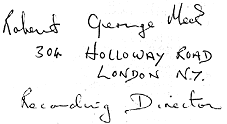|
Joe Meek - a Portrait
A classic story of rise and fall: This is the life of music producer and pop composer Robert George "Joe" Meek (born April 5, 1929 in Newent, Gloucestershire; died February 3, 1967 in London) - a short life somewhere on the fine line between vision and lunacy, always floating forth and back from the one to the other; oversped, funny, sad, euphoric, depressed; a rollercoaster trip with a dramatic showdown. The story of a man who possibly could have been even a genius - if he weren't standing in his own light all over again. But a leopard can't change its spots. It's not only the singer or the song that makes a hit, it's the sound as well. Meek was the first European music producer who completely got that. He saw his sound recording studio as his musical instrument, and he was a virtuoso in playing it. As an extra-ordinary sound tinkerer he can be named in the same breath as Phil Spector, George Martin, Lee Hazlewood, Tom Wilson or the "Motown" or "Stax" studio crews; a Meek production is easy to identify. Although Meek didn't like to stand in the spotlight himself, his influence on the pop music scene is still noticeable. Between 1961 and 1964, Meek's production company R.G.M. Sound Ltd was one of the definitive addresses of Britain's pop world. With this company he produced a couple of smash hits that are internationally known till today; all in all 25 Meek productions reached the UK Top 40. Wannabes were queuing up in front of his door in the north of London; to hear a yes from him they accepted his outbursts of rage as well as his casting couch. For a couple of years he could be called a celebrity; in Great Britain he's still well known. His workshop saw going-to-be pop celebs like Tom Jones (under his then name Tommy Scott), Rod Stewart, Ritchie Blackmore, Jimmy Page or Mitch Mitchell (who later became drummer with Jimi Hendrix); as a member of a band called The Kon-Rads also a saxophone player named Davy Jones entered the studio - today we know him as David Bowie. As it happens to all pop music figures who drifted into legend or myth (or were sent there by their fans), more than forty years after his death there's a lot of nonsense and half-truths circulating about Meek. Today, a lot of what is taken to be true, actually is no more than myths and rumors. Several contemporary witnesses who worked with Meek have passed away or are not willing to talk about him anymore, some others are willing to talk but unfortunately don't remember anything of importance. So it's very difficult today to get information straight from the horse's mouth. This portrait neither intends to praise Meek to the skies nor to reduce him to sheer curiosity. My intention is to evaluate Meek's importance for pop history, his work as a sound engineer and his role as a pioneering independent producer, and at least I tried to do justice to his personality. It may be that by doing that I tarnish some classic Meek myths or come to new views about some questions - views that are sometimes different from the "official" Meek history.
next >>
Sources see part 13 [Home] [Joe Meek Portrait] [Complete Recordings] [Meek Compositions] [Goddard Compositions] [Triumph Story] [CD Discography] [Noten/Scores] [Telstar Cover Versions] [Meek in Germany] [Literature, Documentaries etc.] [Miscellaneous] [Links] [About] [Contact] [Sitemap] © 2006 Jan Reetze
|

